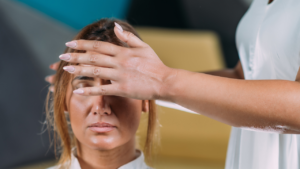Having a spouse that struggles with addiction is hard enough. If they’re struggling with anxiety or another mental health disorder too, it can be totally overwhelming. Maybe you’re thinking, “Having a spouse with addiction is already too much for me to handle. How am I supposed to deal with another disorder as well?” Like anything else, knowledge is power. We’ll walk you through some tips for helping your partner that struggles with addiction and a co-occurring disorder like anxiety.
So, What is a Co-Occurring Disorder?
A co-occurring disorder is when an individual struggles with more than one mental health disorder at a time. For example: Your husband or wife may struggle with addiction and anxiety or addiction and depression. In reality, often addiction stems from other mental health disorders, as people try to self-medicate with substances available to them.
Understanding a spouse’s co-occurring disorders is intimidating, because you want to help, but don’t know how or where to start. The truth is, the more you understand their mental health disorders — especially addiction — the more confident you’ll feel about helping them. It may even make you closer to your partner!
So, how do you help your loved one when they do have a co-occurring disorder? Here are some tips.
Dealing with Anxiety Through Validation
One of the best ways you can help your partner with their anxiety and addiction, or any co-occurring disorder for the matter, is by simply validating their feelings. (Yes, even if your spouse or loved one is acting like the world is ending because something small happened, you should validate them.)
Someone dealing with anxiety often struggles with cognitive fusion, which means once a negative possibility pops into their head, it leads to a worse possibility, and another possibility, and keeps going down the rabbit hole. Ultimately, it’s a straight path from one little thing happening to their entire world crashing down. Obviously, this is unhealthy and not a sustainable way to live. Still, reminding of that in the moment is not helpful. You must put yourself in their shoes and think about the way they must be feeling. Remember, extreme anxiety can cloud your loved one’s mind as much as drugs or alcohol.
Ask them to be honest with you about where their thoughts are at. Your openness to understanding them will create a safe space where they feel comfortable explaining their anxieties to you. The more you understand where they’re coming from, the more you can work together to relieve their stress and prevent a possible relapse.
Anxiety, Addiction & Co-Occurring Disorders: Do Your Research
Knowledge is power, so begin doing your own research! Understanding co-occurring disorders and how they play off of each other will help you figure out what’s the best way you can help your spouse. Understanding more about anxiety (or any mental health disorder) will help you understand their addiction as well.
Reading up on addiction and the mental health disorders your partner may be struggling with will help you learn tools to use when dealing with their anxiety. You may even be able to help your partner find tools to use in their everyday life. Actively doing your research on your partner’s mental health disorders will show them how much you really care and can help improve trust and understanding in your relationship. This blog is a great place to start!
Tools for Dealing with Anxiety
After doing your research, try to help implement the tools your have learned into your life with your partner. Breathing exercises and meditation are a couple of ways to help with anxiety.
It’s all about attraction rather than promotion. That means that the best way you can help is by being a good example. Let your partner see you practicing your new healthy habits and share with them how they are positively impacting your life. At some point, you might even suggest that they join you. Breathing together will help you both relax.
Above all, if you don’t know how you can help with their anxiety, ask. Know that sometimes, there isn’t anything you can say that will help their anxiety in the moment. Even if there’s nothing you can say, though, something as simple as holding their hand through their panic can slowly work them down off that ledge of anxiety. Knowing they are not struggling alone may even help prevent a relapse.
Self-Care & Setting Boundaries Around Addiction & Anxiety
When you have a spouse or partner with a co-occuring disorder, validate their feelings, but don’t forget about yourself! Loving someone with anxiety and/or addiction can be hard. Self-care is so important and you need to be kind to yourself. If you can’t take care of yourself, you can’t be there 100% for someone else.
What does that mean? Set boundaries with your partner. Let them know that you love them, but you also need some time for yourself. Do something you enjoy. We all need alone time to decompress. At the same time, don’t forget you need to set boundaries around your work and home life too. Sometimes we don’t realize that allowing work to seep into other parts of your life pulls you away from your loved one and your self-care time.
Residential Addiction Treatment & Dual Diagnosis
The most important way you can help a spouse or partner struggling with co-occurring disorders is to support the decision to seek professional treatment — or even, to suggest it. Anxiety and other mental health disorders almost always fuel addiction, so if your partner is struggling, they can’t get better alone. As much as you want to help make everything better for them, you can’t deal with it on your own, either.
Finding a residential treatment center that practices dual-diagnosis is key to not only getting your loved one sober — but getting them to stay sober. At Transformations Care, we believe that dual diagnosis and treating underlying mental health conditions is the best way to treat addiction. Through our residential treatment program, we can help your loved one work through unresolved issues and help them find the first steps to a better life. We will help them on their path to recovery and ultimately bring them back to you — so you both can continue on to a healthier relationship and a happier life.
If you’re not sure whether your loved one is struggling with a co-occurring disorder, but see signs of addiction, please reach out to us. We can help your loved one figure out what’s fueling their substance abuse. For more information on signs of addiction, click here.
If you have any questions about co-occurring disorders or dual diagnosis treatment, call us at (424) 339-0965. We’re always here to help you and your family.



















